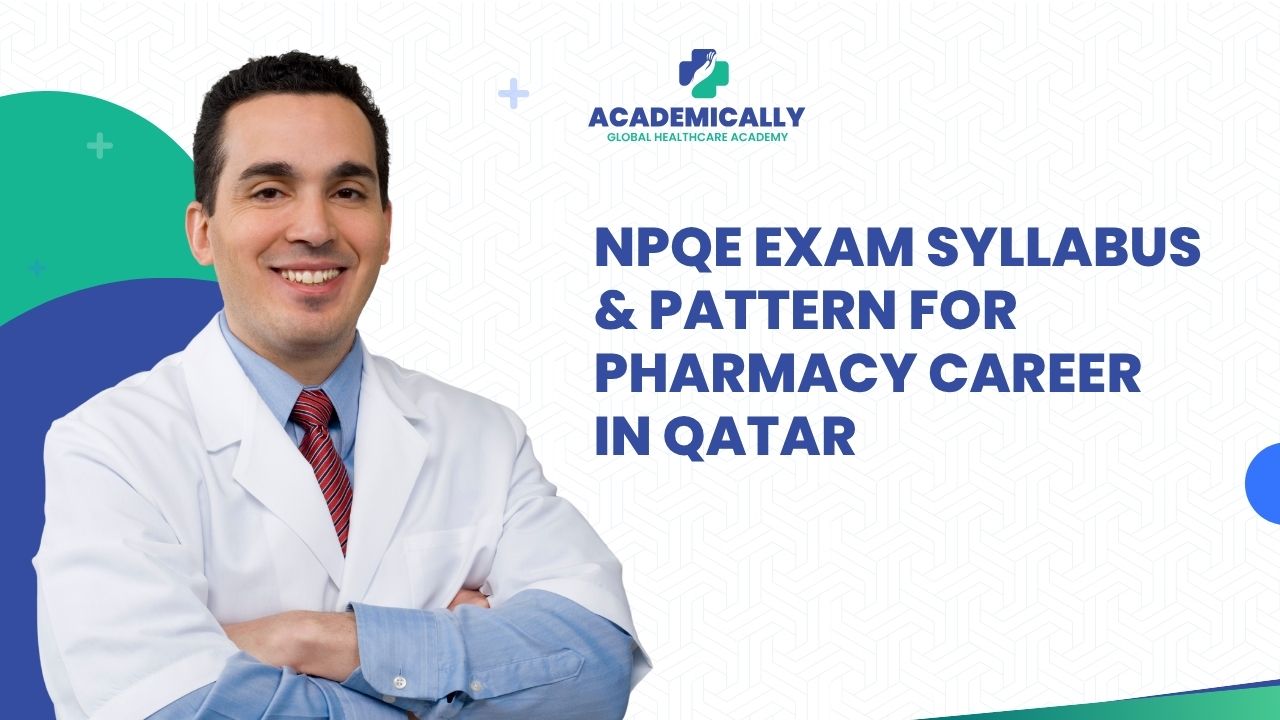Understanding the National Pharmacist Qualifying Exam
The National Pharmacist Qualifying Exam, formerly known as the Qatar Prometric Pharmacist Exam, is conducted by the Department of Healthcare Professionals or DHP. It comes under the Ministry of Public Health/ MoPH.
The NPQE is a standardised test designed to:
- Ensure the competency of pharmacists entering the Qatari healthcare workforce
- Assess the candidate’s knowledge of pharmaceutical sciences, clinical pharmacy, etc.
- Promote safe and effective pharmacy practice
- Standardize qualification for pharmacists from different countries
Passing this exam is necessary for obtaining a pharmacist license in Qatar.
Both Qatari nationals and international pharmacists must pass this qualifying examination.
Eligibility Requirements
Let’s review the eligibility criteria for taking the NPQE.
Educational Qualification:
You need to have a pharmacy degree to be eligible for the exam. This could be:
- Bachelor of Pharmacy or B.Pharm or
- Master of Pharmacy or M.Pharm or
- Doctor of Pharmacy or PharmD
Work Experience:
In addition to educational qualifications, work experience is essential:
- PharmD: 1 year experience
- B.Pharm: 2 years of experience
- B.Pharm/M.Pharm: 2 years of experience.
Professional Registration:
You must be a registered pharmacist in your home country. You will need to present proof of registration from the appropriate healthcare authority during the application process.
Exam Syllabus and Pattern
| Section | Topics Covered | No. of Questions | Weightage |
| Basic Biomedical Sciences | Human anatomy and organ systems, Biochemistry & molecular biology basics, Microbiology & immunology, Pathophysiology of common diseases | 7 | 5% |
| Pharmaceutical Sciences | Medicinal chemistry & drug classification, Pharmacology, Pharmaceutics, Pharmaceutical calculations, Biopharmaceutics, Pharmacokinetics, Quality assurance, Drug manufacturing, Basic pharmacognosy & natural products | 38 | 25% |
| Social/Behavioral/Administrative Sciences | Pharmacy law & Qatar-specific health laws, Healthcare systems, Patient care models, Medication safety & pharmacovigilance, Pharmacy ethics & communication, Public health & promotion, Hospital/community pharmacy management, Health informatics- Prescription monitoring systems | 38 | 25% |
| Clinical Sciences | Drug interactions & contraindications, Therapeutic drug monitoring, Counseling patients, Medication therapy management, Understanding disease states, Clinical case scenarios | 67 | 45% |
The NPQE, like any other Prometric exam, is a computer-based assessment.
Exam Duration- 3.5 Hrs
Number of Questions- 150 MCQs
Syllabus Covered
- Basic Biomedical Science- 7 Qs
- Pharmaceutical Science- 38 Qs
- Social/Behavioural/Administrative Sciences- 38 Qs
- Clinical Sciences- 67 Qs
Pass Marks- 60%
The syllabus is comprehensive. It is a balanced combination of theory, clinical application, and ethical practice. It is divided into four major domains.
The questions are distributed across four key areas with the following weightage:
1. Basic Biomedical Sciences
This section of the syllabus covers concepts in human biology and biochemistry.
Topics include:
- Human anatomy and organ systems
- Biochemistry and molecular biology basics
- Microbiology and immunology
- Pathophysiology of common diseases
These topics are essential for understanding how medications interact with the body.
Number of Questions: 7
Weightage: 5%
2. Pharmaceutical Sciences
This is a major component of the exam. It focuses on:
Topics include:
- Medicinal chemistry and drug classification
- Pharmacology
- Pharmaceutics
- Pharmaceutical calculations
- Biopharmaceutics
- Pharmacokinetics
- Quality assurance
- Drug manufacturing processes
- Basic pharmacognosy and natural products
These topics are crucial for delivering effective patient care.
Number of Questions: 38
Weightage: 25%
3. Social/Behavioral/Administrative Sciences
This section examines the societal aspects of pharmacy practice.
Topics include:
- Pharmacy law and regulations (including Qatar-specific health laws)
- Healthcare systems
- Patient care models
- Medication safety and pharmacovigilance
- Pharmacy ethics and communication skills
- Public health and health promotion
- Hospital and community pharmacy management
- Health informatics
- Prescription monitoring systems
Number of Questions: 38
Weightage: 25%
4. Clinical Sciences
Clinical Sciences focus on the application of pharmacotherapy in patient care.
Topics include:
- Drug interactions and contraindications
- Therapeutic drug monitoring
- Counseling patients
- Management of medication therapy
- Understanding disease states
- Clinical case scenarios
Number of Questions: 67
Weightage: 45%
Tips to Prepare for the Exam?
Strategic preparation is the key to success. Here are a few tips to make your preparation smooth and effective:
Organize the Syllabus
- Break down the syllabus into manageable sections.
- Use official sources and preparation books.
- Refer only to standard and official materials.
Practice MCQs
- Practice with previous years’ MCQs regularly.
- Focus on case-based and clinical questions.
Take Mock Exams
- Take full-length, timed tests to simulate exam conditions.
- Understand weak areas and revise accordingly.
Attend study groups
- Learn and revise in groups to catch up on topics you might have missed.
- Group studies are especially useful for practicing case studies and clinical scenarios.
Join NPQE-Focused Coaching
Academically offers structured courses tailored to NPQE success, including:
- Interactive lectures
- Subject-specific notes
- Practice tests and downloadable PDF notes
- Qatar-specific law modules
- One-on-one mentorship
Study Qatar Pharmacy Laws
Qatar’s healthcare system has unique laws and regulations. Make sure to read up on:
- Medication classification and scheduling
- Controlled drugs and prescribing rules
- Pharmacist duties and responsibilities under MoPH
Exam Day Checklist
On the exam day, ensure you arrive at the testing centre early. Ensure you have the following documents:
- Your passport
- The appointment confirmation letter
Post-Exam Steps: Applying for Jobs and Obtaining a Visa
Once you’ve passed the exam, it’s time to find a job. Then you can obtain a work visa:
Apply for Jobs: There are many websites where employers upload job posts. You can utilize online job portals and recruitment agencies.
Employment Options:
- Government hospitals under Hamad Medical Corporation (HMC)
- Private hospitals and polyclinics
- Retail pharmacy chains
- Community pharmacies
- Academic or research roles
- Clinical pharmacy roles in care centers
Visa Process: Your employer in Qatar can help you get a work visa. Make sure you have all the necessary documents before applying.
Benefits of Working as a Pharmacist in Qatar
Working as a pharmacist in Qatar has many benefits. Similar to other Gulf countries, Qatar also provides a tax-free salary and ample career scope.
Tax-Free Salary: A tax-free salary is an interesting feature - one can save much and lead a financially comfortable lifestyle. A pharmacist in Qatar earns 1,200 QAR per month, which is around 2.5 lakh INR per month.
Vast Scope of Career Growth: The rapidly developing healthcare sector in Qatar allows scope for growth for pharmacists in their careers.
High Quality of Life: Qatar provides a safe environment with modern infrastructure and a diverse expat community.
Final Thoughts- Take Your First Step Towards a Pharmacy Career in Qatar
The NPQE is more than just an exam. It opens up the path to an exciting and well-respected pharmacy career. Qatar is the Middle East’s fastest-growing healthcare system. To have a career here is a dream that you can achieve with our help.
With the right understanding and preparation strategy, you can ace this test. Move one step closer to your professional goals in Qatar with Academically.
We provide more than just NPQE exam coaching. With us, you will also find:
- AI-adaptive Mock Tests, to get students acquainted with real-time exam scenarios.
- Interaction with successful alumni of the course working in Qatar.
- Community groups to connect with people working towards the same goal.
- 1-on-1 sessions with experts for doubt-clearing.
- Live and recorded sessions to practice at your own pace.






